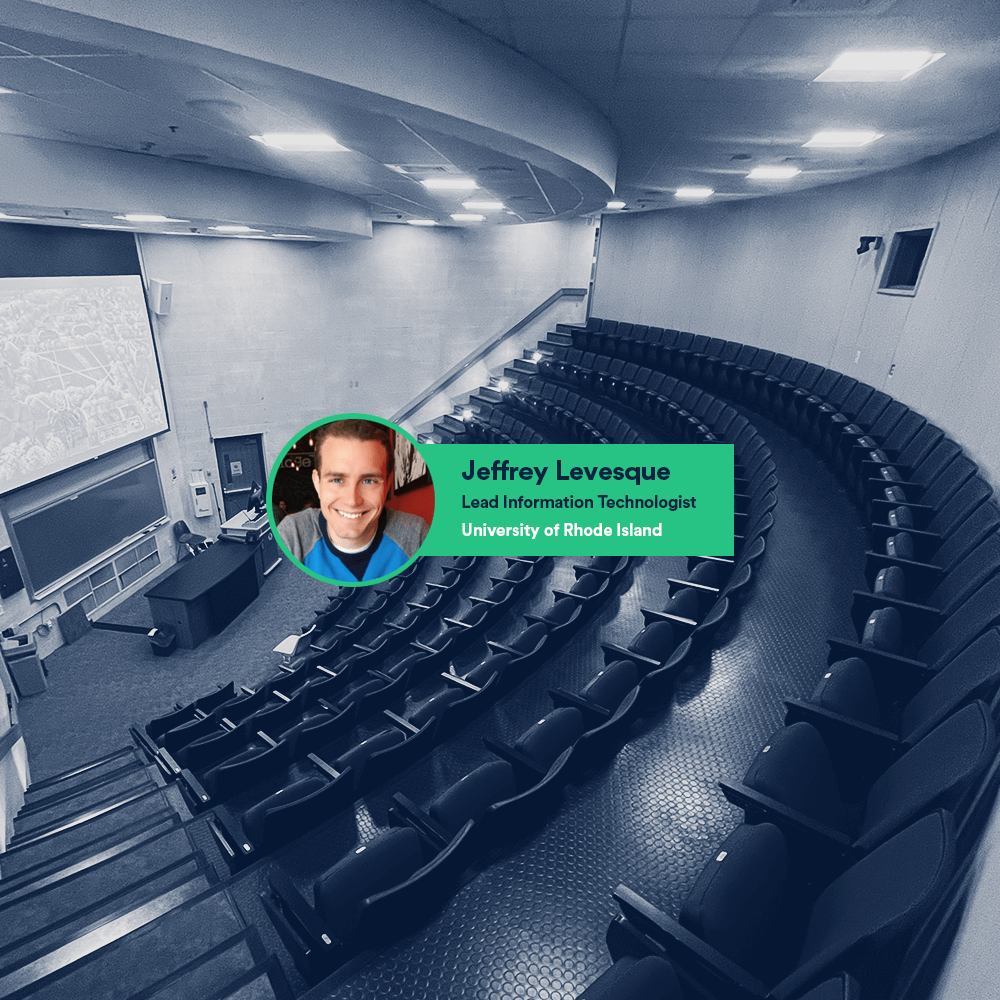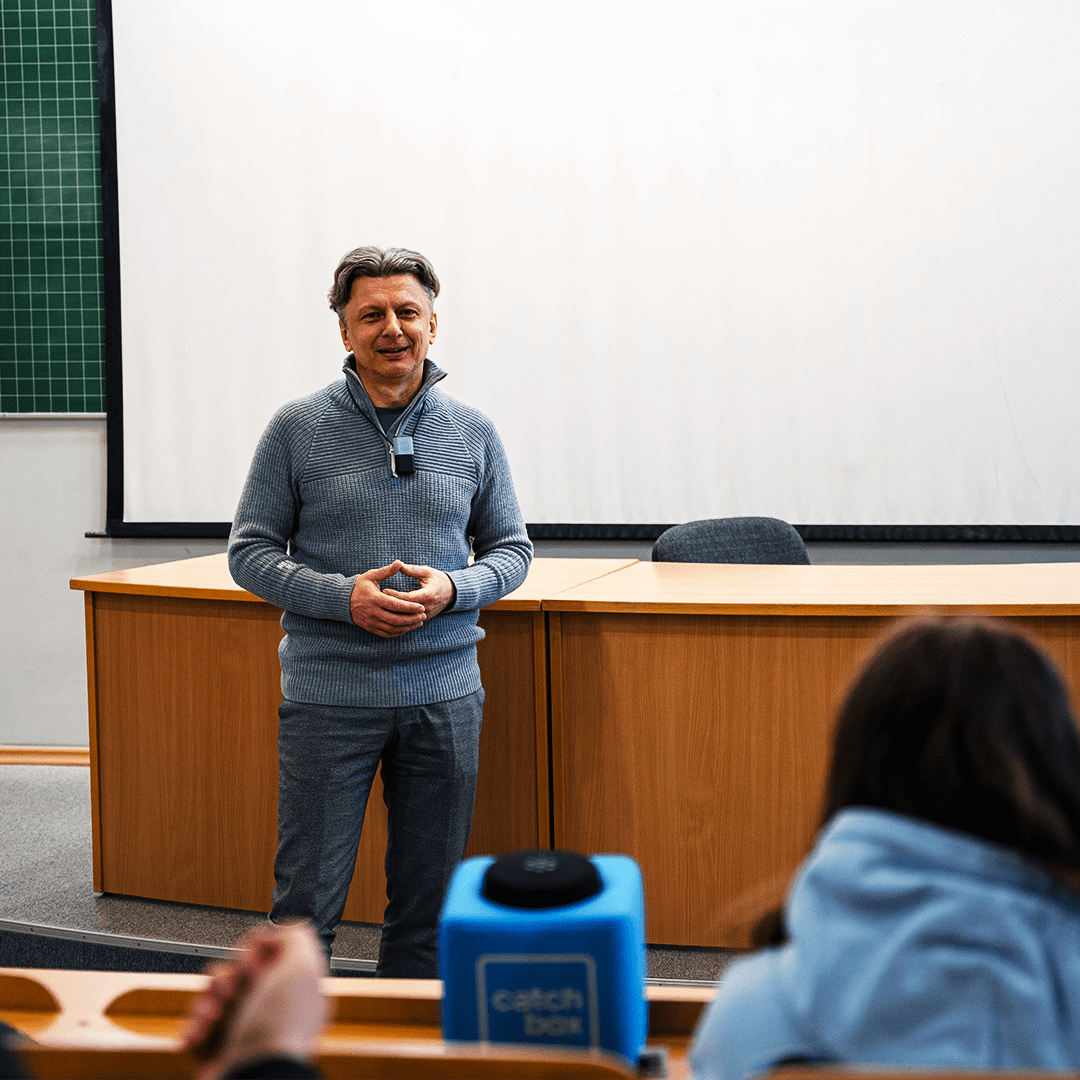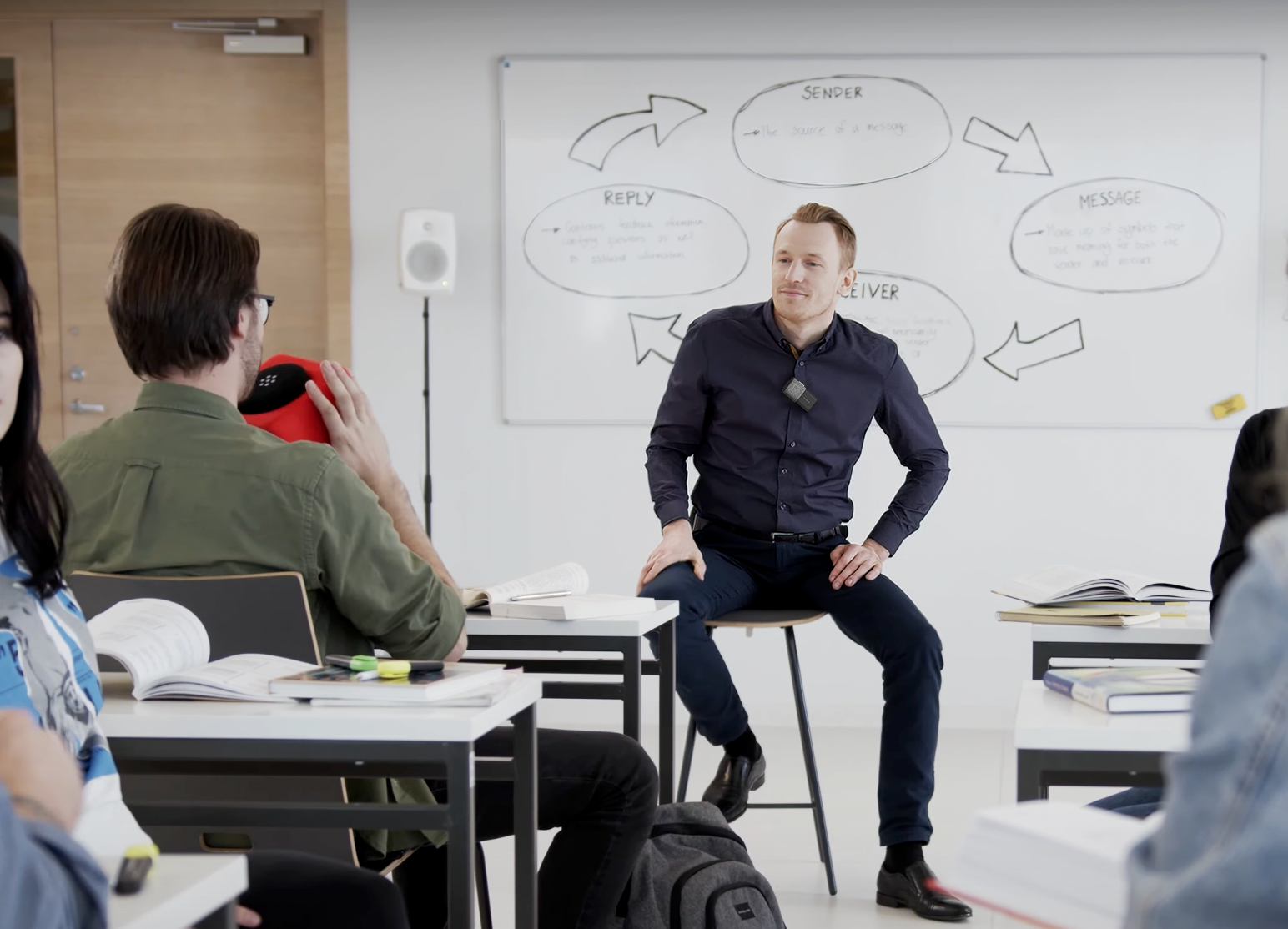
University of Rhode Island case study
Ease of use at the center of AV standardization
Recently ranked the #1 public university in New England, URI has been at the forefront of adapting to the evolving needs of modern higher education.
In short

Challenge
Managing diverse AV setups across 150 rooms resulted in inefficiencies and frequent support requests, such as replacing misplaced mics, fixing broken lavaliers, and repeating user instructions.

Solution
URI adopted the Catchbox Plus wireless microphone system as their new audio standard, seamlessly integrating with their AV over IP setup while utilizing a simple USB connection for certain configurations.

Results
URI significantly reduced AV support requests and maintenance issues, improving efficiency for the AV team. Faculty appreciated the system’s ease of use, while student engagement increased.

Intro
Today, virtually any class, hall, or auditorium must accommodate lecture capture, voice amplification, and hybrid learning in some form or another. This shift has placed URI's AV team in a crucial role, tasked with making the learning experience seamless and equitable for students and faculty alike.
We caught up with Jeffrey Levesque, Lead Information Technologist at URI, who has been spearheading the integration and management of AV technologies in learning spaces across the campus for nearly a decade.
The challenge: Managing complexity in a diverse environment
“Lead Information Technologist doesn't tell the full story,” Jeffrey laughs. “In practice, I'm the AV designer, engineer, programmer, and support for the campus”.
URI's and Jeffrey's journey with classroom technology is one that many universities and AV teams will find familiar. What began as a few tech-equipped spaces rapidly expanded, especially during the pandemic, resulting in a diverse array of technologies across classrooms. This diversity, while born out of necessity, quickly became unmanageable.
"Every room looks different," Jeffrey explains.
"You might have different endpoints, one screen or multiple screens. We get a lot of questions, especially in the summertime when instructors are trying to figure out where they are teaching in the fall."
This inconsistency led to a flood of support requests, particularly at the beginning of each academic year. The small AV team of just four people, responsible for managing technology in about 150 rooms, found themselves overwhelmed – “the call volume was unbearable”, Jeffrey recalls.
What were the most common tasks? Instructing on the technology, recharging misplaced mics, appeasing frustrated lecturers, and endlessly changing out broken lavalier mic wires –
“Instructors kept wiring up wrong and breaking them in the process. It happened so much, I stopped getting the really high quality ones, as they would break them anyway,” Jeffrey sighs.
Adding to the complexity was the need for hybrid learning capabilities, thrust into the spotlight by the COVID-19 pandemic. Many classrooms lacked the necessary audio equipment to support this format effectively.
"The pandemic forced my campus to jump forward and do hybrid learning. I need to get audio in all my classrooms now because only the big spaces had any sort of microphone technology."
The solution: Standardization and simplification with Catchbox Plus
Facing these challenges, Jeffrey embarked on a mission to create a reliable and scalable AV setup across all rooms, carefully choosing technology that would form part of that standard. The new classroom standard incorporates best-in-class technology such as Epiphan Pearl Nexus (video capture, recording, streaming), Panopto (content management, scheduling), Q-SYS NC Series (PTZ cameras) and more.
The Catchbox Plus wireless microphone system emerged as the perfect solution for their audio capture needs.
"We're putting a Catchbox Plus in every classroom," Jeffrey states. "By the time we're done, we're gonna be right around 150 of them across campus."
Why Catchbox Plus? The answer lies in its reliability, user-friendliness, and versatile connectivity options. Or, as Jeffrey puts it – simplicity, simplicity, simplicity.
Simplicity #1: Reliability and ease of use
Unlike their previous audio systems, which were complex to use and maintain, Catchbox Plus proved to be refreshingly simple.
"I don't just need crisp clear audio. I also need it to be simple for my instructors to use. The simpler I can make it for them, the better," Jeffrey emphasizes. And that's exactly what he got with Catchbox Plus wireless microphone system – just pick up the Clip or Cube and it works.
Jeffrey finds the magnetic docking stations to be particularly well-suited for the classroom environment. “I can have the charging station on the lectern and the magnet ensures the mics are always in the right place and charging for the next user. Unlike our previous solutions that needed to be carefully connected to the charger in a specific way – something instructors would fail to do over and over again”.
Another load off of Jeffrey's shoulders was that Catchbox worked out of the box – he wouldn't have to go into settings and adjust sound levels for each setup.
Plus, “it picks up audio tremendously. It just comes through sounding clean no matter whether they're holding the Cube up close and personal or they hold it further away. It picks them all up equally and everyone comes through sounding great.”
The team also found that Catchbox required minimal maintenance compared to their previous systems.
“At the start of this year, we were like – where are the calls? With Catchbox, support tickets and general maintenance have gone way down,” Jeffrey notes with relief.
Simplicity #2: Versatile connectivity and integration
Catchbox's versatile connectivity options were another significant advantage. Whether integrating with their existing AV over IP system or providing a simple USB connection for hybrid learning, Plus system delivered.
"Why we like the Catchbox microphones so much better is that if I don't have a DSP in the room, I know I can take the USB out on that and feed that to a computer and I'm good," Jeffrey explains.
The ease of installation was also a major plus. "They were easy to install. Because they're also PoE powered, I just have to plug in my single network cable and we pop up online. I go into my Dante controller and I send it where it needs to go."
“Whenever I'm evaluating AV tech, the first question I have is – does it integrate with what I'm using as the control system for my classroom? Catchbox's many integrations meant I didn't have to worry on that front.”
Simplicity #3: An effortless way to boost student engagement
Perhaps most importantly, Catchbox has helped boost student engagement, particularly in large classrooms where interaction was previously challenging.
The unique throwable design of the Catchbox Cube has turned asking questions into an engaging activity that students genuinely want to participate in. Previously, handheld mics were passed around for audience engagement, and wanting to ask a question was often met with a collective groan from peers, as it would mean awkwardly passing the microphone hand-to-hand across the hall and disrupting the flow of the lesson.
"Everyone, anytime anyone gets to use the Cube, they're blown away by how well it works,"
Jeffrey shares, when asked about what the end users think of Catchbox. "Instructors like that there's more engagement in the classroom now. It's more interactive for them."
“Now, students are eager to engage, even if it's just to throw the Cube. And instructors are happier because of the active audience,” Jeffrey shares.
URI also appreciates the branding feature – being able to put the university's logo on the microphones. “It's somehow a small bonus and a massive benefit at the same time,” Jeffrey shares. “We're already branding the lecterns, and visibility and recognizability are very important for the university.”
As URI continues its journey towards a fully standardized AV setup across all classrooms, Catchbox has become an integral part of their strategy.
Would Jeffrey recommend Catchbox Plus to others?
“I already do. I tell them – it's going to make your life easier on campus.”
Want to hear it for yourself?
Catchbox Plus online demos are always available. And if you're with a university, you can request a free trial unit, available for a limited time, to test in your own classrooms and lecture halls.
Catchbox for your university

Audio capture solution for universities
Equip your unsupervised classrooms and lecture halls with intuitive yet professional wireless microphone system.

Get in touch with Catchbox expert
We are here to help - get expert guidance from our team and discover how Catchbox can transform your classrooms.